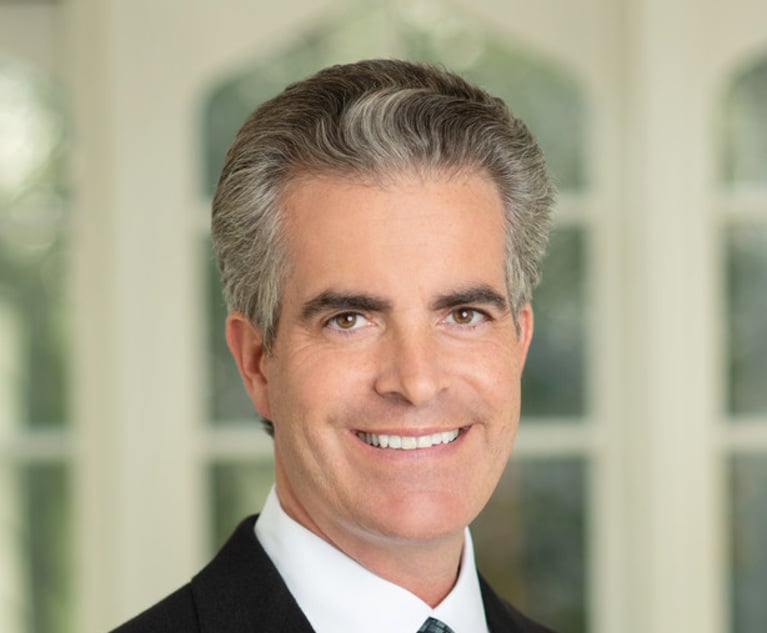 Photo: Jason Doiy
Photo: Jason DoiyJustices to Review Ruling Calling for New Trial Because of Judge's Absence During Voir Dire
The issue centered on the absence of the Allegheny County judge during voir dire, and a lack of any firsthand observation of the jurors' demeanor during that process.
January 31, 2019 at 12:41 PM
4 minute read
The Pennsylvania Supreme Court has agreed to hear arguments over whether the Superior Court was required to defer to a trial judge's decision not to strike a juror in a medical malpractice case, despite the fact that the judge was absent from the room when the prospective jurors were questioned.
A three-judge Superior Court panel consisting of Judges Mary Jane Bowes, Judith Olson and Deborah A. Kunselman granted plaintiff Mendy Trigg a new trial and reversed an Allegheny County jury's verdict in favor of the Children's Hospital of Pittsburgh of UPMC after Trigg argued that the selected jurors were biased.
The issue centered on the absence of the Allegheny County judge during voir dire, and a lack of any firsthand observation of the jurors' demeanor during that process.
Trigg argued that the lack of judicial supervision allowed biased jurors to slip through the cracks, while the hospital maintained that the issue was a “red herring.”
“The knowledge gleaned from in-person observations is 'impossible to place in the record, [but] must be considered,'” Kunselman wrote in the court's opinion. “An absentee judge misses the crucial instant when would-be jurors reveal their inmost selves by both words and actions.”
UPMC pointed to a rule of civil procedure stating that clerks can act as stand-ins for judges during the jury selection process. The Superior Court disagreed with the application of that rule in Trigg's case.
“By not contemporaneously observing the jurors' responses, when ruling on challenges for cause, the trial judge in this case deprived himself of any greater perception of the jurors' partiality than an appellate court can discern by reviewing the same, cold record,” Kunselman said.
Kunselman illustrated the point by referencing a response from one juror who had a bias toward health care professionals because her family members are doctors, and said that she would probably find in favor of a doctor or hospital if the case was a “close call.”
Juror 29 continued, “I see what they go through and I know how much they care about their patients and I know they would never do anything wrong.”
Kunselman noted, “This answer shows her implicit trust for medical professionals. Juror 29 clearly viewed the patient/doctor relationship through the rose-colored glasses of familial love and admiration, and assumed the medical professionals sued in this case would do no harm.”
In a concurring statement from Bowes, the judge said she agreed with the majority ruling and further urged Allegheny County to re-evaluate its jury selection procedures.
“The judge makes the decision whether to disqualify a potential juror based upon a review of transcribed answers to voir dire questions, or in some cases, after a subsequent interview with the challenged individual,” Bowes said. “For the reasons cited by the majority, I agree that such a procedure warrants a departure from the deference usually afforded to the rulings of judges who contemporaneously observe or participate in the voir dire process.”
In its one-page order granting allocatur, the Supreme Court agreed to hear argument on three issues:
“a. Whether the Superior Court's decision conflicted with the jurisprudence of this Honorable Court and other Superior Court decisions by failing to apply the 'palpable error' abuse of discretion standard of review and properly defer to the trial court?
b. Whether the Superior Court's holding directly conflicts with Shinal v. Toms, 162 A.3d 429 (Pa. 2017), which requires the denial of a strike for cause of a prospective juror when the prospective juror is willing and able to eliminate influences and render a verdict according to the evidence?
c. Whether the Superior Court improperly considered arguments regarding juror demeanor when those arguments were waived?”
Counsel for the Children's Hospital, Jason Zivkovic of Dickie, McCamey & Chilcote in Pittsburgh, could not be reached for comment.
Counsel for Trigg, Harry Cohen of Harry S. Cohen & Associates in Pittsburgh, said, “We look forward to presenting our case to the Supreme Court.”
This content has been archived. It is available through our partners, LexisNexis® and Bloomberg Law.
To view this content, please continue to their sites.
Not a Lexis Subscriber?
Subscribe Now
Not a Bloomberg Law Subscriber?
Subscribe Now
NOT FOR REPRINT
© 2024 ALM Global, LLC, All Rights Reserved. Request academic re-use from www.copyright.com. All other uses, submit a request to [email protected]. For more information visit Asset & Logo Licensing.
You Might Like
View All

Pittsburgh Judge Rules Loan Company's Online Arbitration Agreement Unenforceable
3 minute read
Phila. Jury Awards $15M to Woman Who Slipped on Apartment Building Stairs
4 minute read
Pa. Hospital Agrees to $16M Settlement Following High Schooler's Improper Discharge
4 minute readTrending Stories
Who Got The Work
Michael G. Bongiorno, Andrew Scott Dulberg and Elizabeth E. Driscoll from Wilmer Cutler Pickering Hale and Dorr have stepped in to represent Symbotic Inc., an A.I.-enabled technology platform that focuses on increasing supply chain efficiency, and other defendants in a pending shareholder derivative lawsuit. The case, filed Oct. 2 in Massachusetts District Court by the Brown Law Firm on behalf of Stephen Austen, accuses certain officers and directors of misleading investors in regard to Symbotic's potential for margin growth by failing to disclose that the company was not equipped to timely deploy its systems or manage expenses through project delays. The case, assigned to U.S. District Judge Nathaniel M. Gorton, is 1:24-cv-12522, Austen v. Cohen et al.
Who Got The Work
Edmund Polubinski and Marie Killmond of Davis Polk & Wardwell have entered appearances for data platform software development company MongoDB and other defendants in a pending shareholder derivative lawsuit. The action, filed Oct. 7 in New York Southern District Court by the Brown Law Firm, accuses the company's directors and/or officers of falsely expressing confidence in the company’s restructuring of its sales incentive plan and downplaying the severity of decreases in its upfront commitments. The case is 1:24-cv-07594, Roy v. Ittycheria et al.
Who Got The Work
Amy O. Bruchs and Kurt F. Ellison of Michael Best & Friedrich have entered appearances for Epic Systems Corp. in a pending employment discrimination lawsuit. The suit was filed Sept. 7 in Wisconsin Western District Court by Levine Eisberner LLC and Siri & Glimstad on behalf of a project manager who claims that he was wrongfully terminated after applying for a religious exemption to the defendant's COVID-19 vaccine mandate. The case, assigned to U.S. Magistrate Judge Anita Marie Boor, is 3:24-cv-00630, Secker, Nathan v. Epic Systems Corporation.
Who Got The Work
David X. Sullivan, Thomas J. Finn and Gregory A. Hall from McCarter & English have entered appearances for Sunrun Installation Services in a pending civil rights lawsuit. The complaint was filed Sept. 4 in Connecticut District Court by attorney Robert M. Berke on behalf of former employee George Edward Steins, who was arrested and charged with employing an unregistered home improvement salesperson. The complaint alleges that had Sunrun informed the Connecticut Department of Consumer Protection that the plaintiff's employment had ended in 2017 and that he no longer held Sunrun's home improvement contractor license, he would not have been hit with charges, which were dismissed in May 2024. The case, assigned to U.S. District Judge Jeffrey A. Meyer, is 3:24-cv-01423, Steins v. Sunrun, Inc. et al.
Who Got The Work
Greenberg Traurig shareholder Joshua L. Raskin has entered an appearance for boohoo.com UK Ltd. in a pending patent infringement lawsuit. The suit, filed Sept. 3 in Texas Eastern District Court by Rozier Hardt McDonough on behalf of Alto Dynamics, asserts five patents related to an online shopping platform. The case, assigned to U.S. District Judge Rodney Gilstrap, is 2:24-cv-00719, Alto Dynamics, LLC v. boohoo.com UK Limited.
Featured Firms
Law Offices of Gary Martin Hays & Associates, P.C.
(470) 294-1674
Law Offices of Mark E. Salomone
(857) 444-6468
Smith & Hassler
(713) 739-1250





